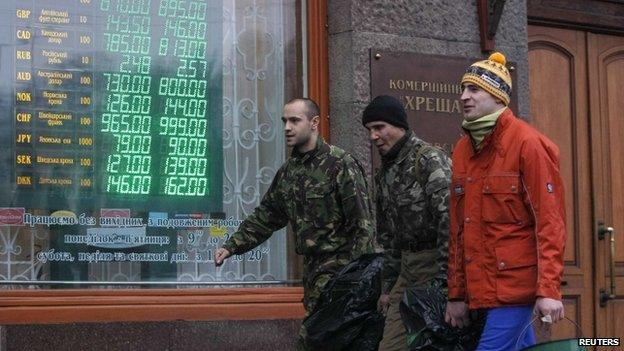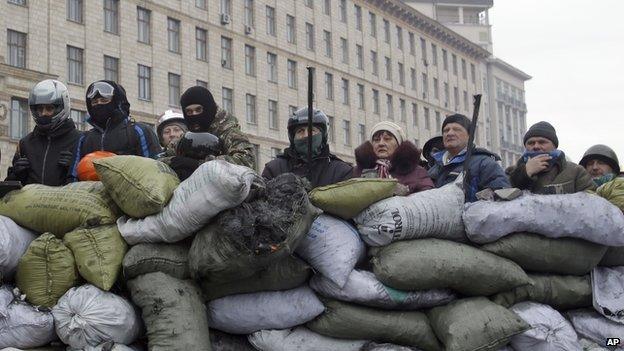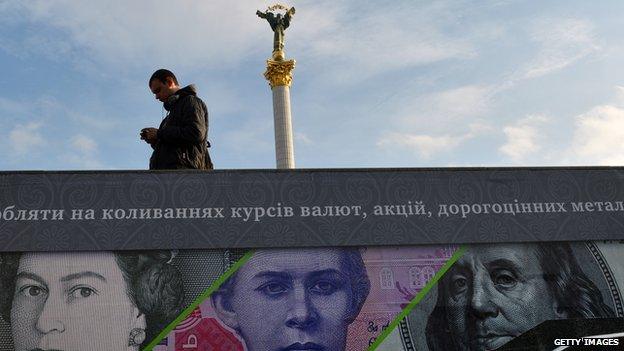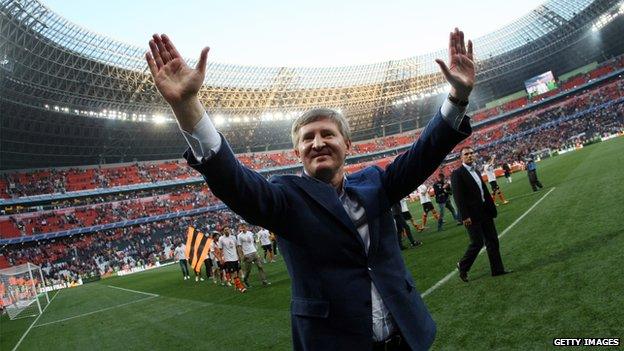Ukraine's failing economy: Who is to blame?
- Published

Ukraine faces mounting foreign debt and a rising trade and budget deficit after months of recession
Ukraine's national currency, the hryvnia, has plunged to its lowest official level against the US dollar since its inception nearly 18 years ago.
After weeks of intervention on the currency markets in an attempt to keep the currency stable, Ukraine's Central Bank last Thursday cut the exchange rate and imposed capital controls.
These include a limit on private transfers abroad and a ban on foreign currency purchases for overseas investment.
According to official data, in January alone the central bank spent $1.7bn (£1.04bn; 1.25bn euros) propping up the exchange rate, leaving current currency reserves at just $17.8bn. That is less than Ukraine needs to cover two months of imports.
Ukrainian officials blame the 10% devaluation of the national currency since November on the mass protests and an economic slowdown in developing countries.
But observers see the hryvnia's fall as a natural result of several years of poor economic policy, which left the country with a rising trade and budget deficit, 18 months of recession and mounting foreign debt.
Fading attractiveness
By the end of 2013, Ukraine's attraction to investors was at its worst for five years, according to the Ukraine-based European Business Association (EBA).
Investors say the government's refusal to sign the EU-Ukraine Association agreement came on top of traditional problems for those investing in Ukraine such as corruption and technical barriers affecting trade, currency regulation and customs clearance.

The Ukrainian authorities blame the anti-government protests for the devaluation of the hryvnia
"Investors expected that the association agreement with the EU would become an instrument to set up more transparent and fair rules [for business] in Ukraine. That didn't happen," says EBA acting director Anna Derevianko, whose group represents 900 companies working in Ukraine.
"Now, for the first time, investors are saying that they don't expect any positive changes at all."
Aware of the risks, foreign businesses had been attracted by the prospects of the Ukrainian market. But that assessment has changed.
"Now we have very high risks and very limited perspectives," says Taras Luckachuk, general director of Kraft Foods Ukraine.
Ruin of small businesses
While larger companies are assessing their future in Ukraine, smaller businesses have their hands tied.
Self-employed Kiev businessman Eugene, 33, joined the protests in the centre of the capital.
"I had a small consultancy in investments and taxes for small businesses. Since small business has been ruined, I have no-one to consult."
There are many more businessmen like him among the protesters in Kiev and in other cities. They say they are tired of massive corruption and pressure on their business - whether from tax, customs or health inspectors.
Between 2010 and 2012 the number of businesses shrank by 600,000, according to the state statistics committee of Ukraine.

Small businessmen who say they have grown tired of corruption have joined the anti-government protests
Since Soviet times, eastern Ukraine has been the stronghold of Ukrainian industry, the homeland of most Ukrainian oligarchs and the electoral base of President Viktor Yanukovych's Party of the Regions.
In the first half of 2013 they, like the president, appeared to support the EU Association agreement. But things changed when problems emerged in trade with Russia.
The heavy industry bosses, with only Russia to sell their products to, said the price for European integration was too high.
Steel industry "heavyweights", with export markets in the EU and Asia, maintained their silence.
But when the peaceful protests turned violent and the West began discussing possible targeted sanctions against Ukrainian officials allegedly implicated in the use of, some oligarchs spoke up.
Exodus abroad
Rinat Akhmetov, whose estimated worth is $15.4bn and is 47th on Forbes' list of billionaires, made a statement on his company System Capital Management's (SCM) website calling for an explanation for the decision not to sign the EU agreement in November.
"Did Ukraine stop? Or did Ukraine take another road? Everyone wants clarity."

Rinat Akhmetov, who is the president of the Ukrainian football club Shakhtar Donetsk, spoke out against the government's decision not to sign the EU Association agreement
Activists, who protested near Mr Akhmetov's apartment at One Hyde Park in London, urged him to share his thoughts with President Yanukovych.
At the same time, people have been leaving Ukraine, particularly from the more rural and pro-EU west of the country, in search of work and money to support their families.
In this way they have become major investors in Ukraine. In 2012 they've sent home $7.5bn (4% of Ukraine's GDP) through bank transfers.
According to the World Bank, Ukraine is among the top 10 recipients of remittances from abroad, with transactions reaching $9.3bn in 2013. It estimates the total number of Ukrainians working abroad at close to five million.
And they have seen the difference in how business is run abroad.
"In Poland you can take a loan for 7%, in Germany you'll pay 3%," says Lviv businessman Zenoviy Berms. "In Ukraine, it will cost you 25-30% to borrow from the bank."